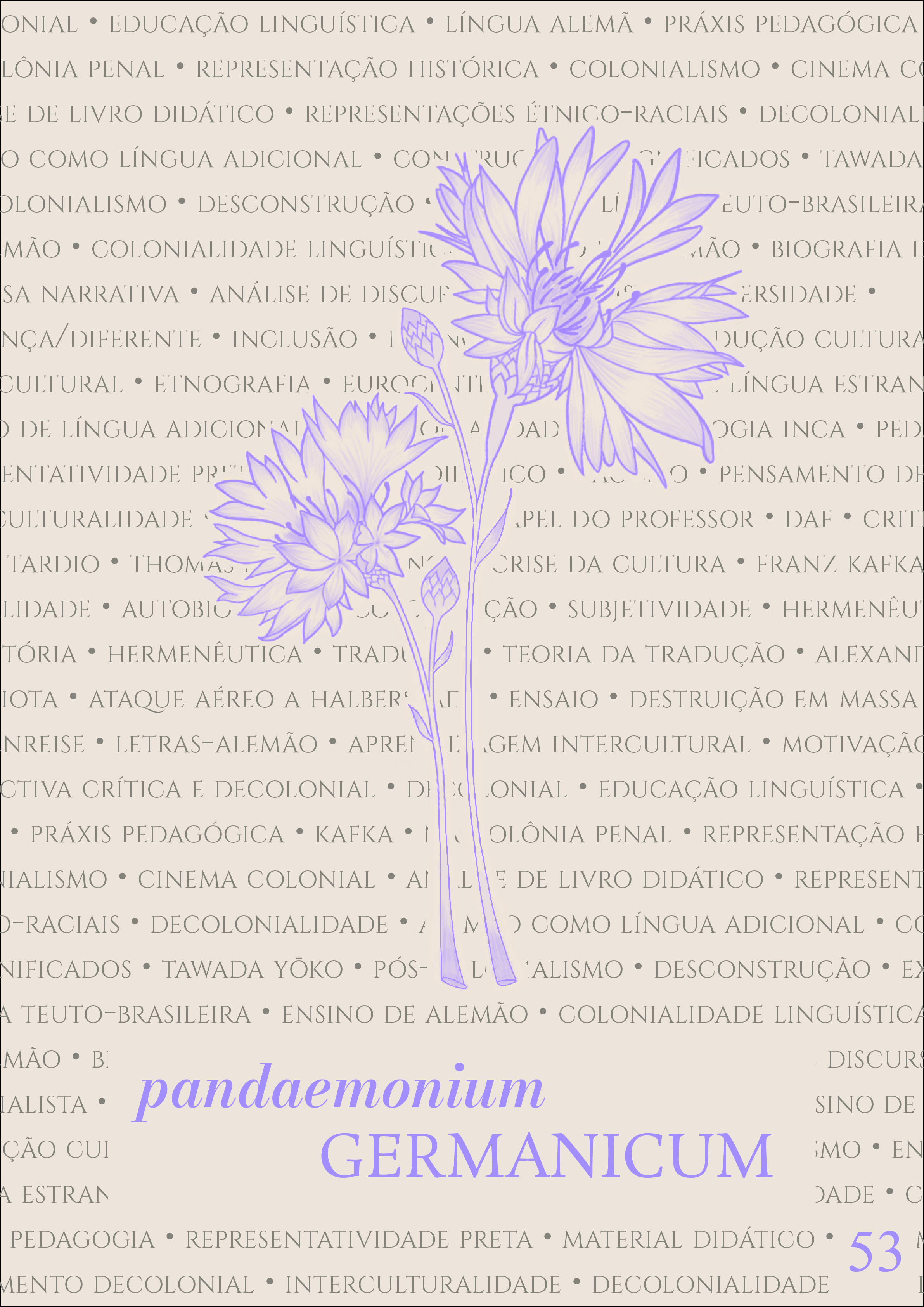Kafka e o cinema: representações do passado colonial
DOI:
https://doi.org/10.11606/1982-8837275338Palavras-chave:
Kafka, “Na Colônia Penal”, representação histórica, colonialismo, cinema colonialResumo
O colonialismo é um conceito que escapa a uma definição única, rígida. Embora seja um fenômeno histórico, sua compreensão é fluida, redefine-se ao longo do tempo e influencia nossa interpretação do período histórico em questão. Neste artigo, a partir das narrativas de Na Colônia Penal, de Kafka, e dos filmes coloniais África Oriental Alemã. Uma grande escola pública na província de Usambara e Secretário de Estado Dr. Solf visita o Togo em outubro de 1913, analisaremos representações do colonialismo que complexificam e mostram como os eventos eram percebidos contemporaneamente. Este ensaio explora a interação entre ficção, realidade e imaginação no contexto do colonialismo europeu. À medida que essas narrativas constroem representações da realidade, elas também moldam sua própria percepção da realidade, transcendendo o conceito de “real”. Desse modo, Kafka só pôde escrever sobre o colonialismo considerando o seu imaginário anterior presente em outras mídias, como nos filmes documentários. Esse imaginário se materializou nesses três textos nos dando uma dimensão de como a colonização era representada na época de sua efetivação.
Downloads
Referências
ANDERS, Günter. Kafka: pró e contra: Os autos do Processo. Tradução, posfácio e notas: Modesto Carone. São Paulo: Cosac Naify, 2007.
BENJAMIN, Walter. Magia e técnica, arte e política. Escritos escolhidos I. São Paulo: Brasiliense, 1985.
BOAHEN, Albert Adu. História geral da África, VII: África sob dominação colonial, 1880-1935. 2.ed. rev. Brasília: UNESCO, 2010.
BORN, Jürgen. Franz Kafka: Kritik und Rezeption zu seinen Lebzeiten 1912-1924. Frankfurt am Main: Fischer, 1979.
BRECHT, Bertolt. Über die moderne tschechoslowakische Literatur. Werke – Große kommentierte Berliner und Frankfurter Ausgabe (Herausgegeben von Werner Hecht, Jan Knopt, Werner Mittenzwei und Klaus-Detlef Müller) – Band 22. Frankfurt am Main: Suhrkamp Verlag, 1993.
BRITO, Eduardo Manoel de. Quando a ficção se confunde com a realidade: as obras In der Strafkolonie/ Na Colônia Penal e Der Process/O Processo de Kafka como filtros perceptivos da ditadura civil-militar brasileira. São Paulo: Tese (Doutorado) - Faculdade de Filosofia, Letras e Ciências Humanas da Universidade de São Paulo, FFLCH/USP, 2006.
BROD, Max. Über Franz Kafka. Frankfurt am Main: Fischer Verlag, 1966.
CALÇA, Elaine. Os Expedicionários e suas Relações com o Imperialismo a partir de Adolf Bastian (1870-1890). Dissertação (Mestrado Acadêmico em História). Universidade Estadual Paulista (UNESP), Faculdade de Ciências e Letras, Assis, 2019.
FERRO, Marc. História das colonizações: das conquistas às independências: séculos XIII a XX. São Paulo: Companhia das Letras, 1996.
FUHRMANN, Wolfgang. Propaganda und Unterhaltung: Kolonialismus im frühen Film. In: WARNKE, Ingo H. (org.). Deutsche Sprache und Kolonialismus: Aspekte der nationalen Kommunikation 1884 und 1919. Berlim: de Gruyter, 2009, 349-364.
FUHRMANN, Wolfgang. Imperial Projections: Screening the German Colonies. Nova York: Berghahn Books, 2015.
GAGNEBIN, Jeanne-Marie. Escrituras do corpo. In: Lembrar escrever esquecer. São Paulo: Editora 34, 2006, 119-134.
GOEBEL, Rolf. Kafka and Postcolonial Critique: Der Verschollene, “In der Strafkolonie,” “Beim Bau der chinesischen Mauer”, in: A Companion to the Works of Franz Kafka, ed. James Rolleston Rochester, NY, 2002.
GOETSCHEL, Willi. Franz Kafka's “In der Strafkolonie”. The Germanic Review: Literature, Culture, Theory, v. 90, n. 2, 81-86, 2015.
HEIN, Franziska. Ein Ort der Geschichten, Süddeutsche Zeitung, 2012.
ISER, Wolfgang. Akte des Fingierens. In: Das Fiktive und das Imaginäre. Perspektiven literarischer Anthropologie. Frankfurt a.M.: Suhrkamp, 1993.
KAFKA, Franz. In der Strafkolonie. Leipzig: Kurt Wolff Verlag, 1919. Livro Eletrônico, Adobe Digital Editions.
KAFKA, Franz. Na Colônia Penal. In: Essencial. Tradução Modesto Carone. São Paulo: Companhia das Letras em associação a Penguin Group, 2011. Livro Eletrônico.
NAGL, Tobias. Die unheimliche Maschine Rasse und Repräsentation im Weimarer Kino. Munique: Edition text + kritik, 2009.
OKSILOFF, Assenka. Picturing the Primitive. Nova York: Palgrave Macmillan US, 2001.
PULVER, Max. Erinnerungen an eine europäische Zeit: Begegnungen mit Rilke, Kafka, Klee, Meyrink und anderes. Zürich: Orell Fuessl, 1954.
QUIJANO, A. Colonialidad del poder, eurocentrismo y América Latina. In: LANDER, E. (org.). La Colonialidad del Saber: Eurocentrismo y Ciencias Sociales. Perspectivas Latinoamericanas. Buenos Aires: Clacso, 2000, 201-245.
RIEGER, Jeanette. Komische Strafen, strafende Komik: Kafkas ‘Tropische Münchhausiade’ in der Strafkolonie. Oxford German Studies, v. 41, n. 2, 236-252, 2012.
SADOUL, Georges. História do Cinema Mundial: Das Origens a Nossos Dias - vol. I. Tradução: Sônia Salles Gomes. Editora Martins Livreiro: Porto Alegre, 1963.
SCHULER, Thomas. Kälter als ein leeres Ofenloch. Jornal Vienense, 2010. <https://www.wienerzeitung.at/nachrichten/kultur/mehr-kultur/226573-Kälter-als-ein-leeres-Ofenloch.html> (16.11.22).
SELA, Ma’ayan. “Ideological Constructs through the Medium of Fiction in Kafka’s ‘In der Strafkolonie’”. The Germanic Review: Literature, Culture, Theory, v. 90, n. 2, 87-100, 2015.
SOUSA, Celeste Ribeiro; BRITO, Eduardo. SANTOS, Maria Célia. “A recepção da obra de Franz Kafka no Brasil”. Pandaemonium Germanicum, São Paulo, n. 9, p. 227-253, 2005.
SPEITPKAMP, Winfried. Deutsche Kolonialgeschichte. Stuttgart: Reclam, 2008.
SUCHOFF, David. Kafka’s Jewish Languages: The Hidden Openness of Tradition. Philadelphia: University of Pennsylvania Press, 2012, 155–162.
TUCHOLSKY, Kurt. In der Strafkolonie. In: MUHFEIT, Herbert; SPICKER, Friedmann (org.). Franz Kafka – Kritik un Rezeption zu seinen Lebzeiten 1912-1924. Frankfurt am Main: S. Fischer, 1979, p. 94.
WALLERSTEIN, Immanuel. The colonial era in Africa: changes in the social structure. In: L. H. GANN e P. DUIGNAN (orgs.). Colonialism in Africa 1870-1960. v. II. Cambridge: Cambridge University Press, 1970, p. 399-421.
BENJAMIN, Walter. „Franz Kafka. Zur zehnten Wiederkehr seines Todestages“. In: Gesammelte Werke II, 1980, p. 409-438.
ZILCOSKY, John. „Wildes Reisen: kolonialer Sadismus und Masochismus in Kafkas ‚Strafkolonie‘“. In: Weimarer Beiträge, v. 50, 2004.
ZISCHLER, Hanns. Kafka vai ao cinema. Rio de Janeiro: Jorge Zahar, 2005.
Downloads
Publicado
Edição
Seção
Licença
Copyright (c) 2024 Pandaemonium Germanicum

Este trabalho está licenciado sob uma licença Creative Commons Attribution-NonCommercial-NoDerivatives 4.0 International License.



